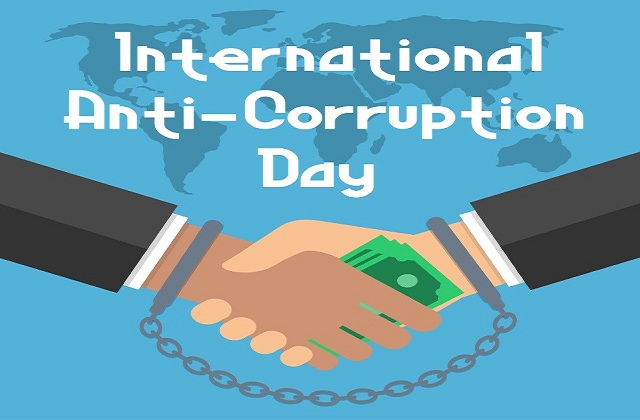Lifestyle
International Anti-Corruption Day 2020: Theme, History, and Importance of the day

International Anti-Corruption Day is celebrated every year on December 9 to highlight the requirement for the eradication of corruption and purposes to build awareness on the ways through which it tends to be decreased.
The United Nations’ (UN) International Anti-Corruption Day proposes to raise public awareness of corruption and what individuals can do to battle it. The day centers around the evil impacts of corruption, which is one of the most infamous socio-political phenomena that influence all nations. The day is seen to raise awareness about the socio-economic issues and how one can fight against them.
Corruption is definitely not a new word for the greater part of us, having experienced it in a few or the other form over the years. International Anti-Corruption Day has been marked for longer than a decade on December 9, in an offer to raise awareness and give a new impulse to anti-corruption efforts. It is a UN Observance, that came into place with the passage of the United Nations Convention Against Corruption in 2003. The Convention went into force on 14th December 2005 with around 140 signatories.
As per the UN website, the Convention spans five areas, in particular, preventive measures, criminalization and law enforcement, international cooperation, asset recovery, and technical assistance and information exchange. The Convention covers a wide range of forms of corruption, such as bribery, trading in influence, abuse of functions, and different acts of corruption in the private sector.
International Anti-Corruption Day 2020 Theme
The theme of the day is, ‘United Against Corruption‘ which focuses on corruption as one of the greatest obstacles to accomplishing the Sustainable Development Goals (SDGs). It will keep on supporting the 2030 Agenda, which forms the backbone of the campaign, not simply this, the campaign will likewise have a youth component. Mobilizing and engaging Youth For Justice is key for guaranteeing sustainable solutions to fight corruption.
This International Anti-Corruption Day 2020 is an opportunity for us to recommit to aggregate activity in preventing and tending to corruption, as we think about the staggering outcomes of COVID-19 on governance institutions, the economy, and society.
As corruption is viewed as one of the greatest obstacles in life to accomplish Sustainable Development Goals. The 2020 theme would keep on supporting the next decade’s agenda, which focuses to have more youth components in their campaign. It is expected that by the next decade, more youth would be enabled to battle against corruption in a sustainable manner.
Corruption flourishes in the midst of emergencies and the progressing global pandemic are no exemption.
States everywhere in the world have taken significant measures to address the health emergency and to stay away from a global economic breakdown. They hurriedly assembled billions in funds to secure medical equipment and give an economic safety net to residents and businesses in distress. The urgent reactions required, notwithstanding, led a few States to trade compliance, oversight, and responsibility for accomplishment of a quick effect, hence making huge opportunities for corruption.
“RECOVER with INTEGRITY” features that simply by setting up successful corruption mitigation measures in place will a superior recuperation be conceivable, while it likewise emphasizes that comprehensive COVID-19 recovery must be accomplished with integrity.
UNDP is deeply dedicated to supporting nations in strengthening transparency, responsibility, and anti-corruption in the time of COVID-19 and beyond. Also, we are focused on uncovering any fraud and corruption in our own activities. As we look towards 2030, let us be united against corruption to recover with integrity and construct a greener, stronger, more inclusive, and more sustainable world for all.
International Anti-Corruption Day History
International Anti-corruption Day history begins on 31 October 2003, when the General Assembly received the UN convention against corruption. From that point forward the United Nations Office on Drugs and Crime (UNODC) was assigned as the secretariat for the Convention’s Conference of States Parties (goal 58/4). The UN General Assembly at that point assigned December 9 as Anti-Corruption Day too, while the convention came into force in December 2005. The United Nations Development Programme (UNDP) and the UNODC are the fundamental forefronts for making awareness about Anti-corruption practices all through the entire global community.
International Anti-corruption Day was launched on October 9th, 2003 by the General Assembly of the United Nations as a method of raising awareness of corruption and featuring the role of the United Nations Convention against Corruption in battling and preventing it.
The official reason given by the UN for making this day is that it was “concerned about the seriousness of problems and threats posed by corruption to the stability and security of societies, undermining the institutions and values of democracy, ethical values, and justice and jeopardizing sustainable development and the rule of law”.
Since the day was first held, the day’s coordinators, the United Nations Development Programme and the United Nations Office on Drugs and Crime, state prejudice towards corruption has developed. This is proven by the expanding number of politicians and CEOs who are being attempted and indicted for the crime.
International Anti-corruption Day Importance
The importance of International Anti-corruption Day is to universally advocate about this malpractice and clarify how and why one ought to avoid it. The day additionally has a significant influence on the Anti-Corruption groups who spread awareness towards this misbehavior and share the means and ways of how one can keep away from corruption at their workplace. The need to stop corruption pulls the path deep for saving the foundation of democratic institutions as corruption distorts the electoral processes by twisting the standard of law. Corruption additionally stunts the economic development of a nation from multiple points of view.
According to UN statistics, every year USD 1 trillion is being offered as bribes while USD 2.6 trillion are taken because of corruptive measures. According to the United Nations Development Programme, it is assessed that there are 10 times of funds lost because of corruption in the developing countries, the funds would have otherwise used in their official developmental assistance. A corruption-free society is a society that guarantees development and prosperity.
Governments, the private sector, non-governmental associations, the media, and residents around the globe are uniting to battle this crime. The United Nations Development Programme (UNDP) and the United Nations Office on Drugs and Crime (UNODC) are at the forefront of these efforts.
-

 Sports4 weeks ago
Sports4 weeks agoAl Ahly vs Inter Miami, 2025 FIFA Club World Cup – Preview, Prediction, Predicted Lineups and How to Watch
-
Health3 weeks ago
Back to Roots: Ayurveda Offers Natural Cure for Common Hair Woes
-

 Tech3 weeks ago
Tech3 weeks agoFrom Soil to Silicon: The Rise of Agriculture AI and Drone Innovations in 2025
-

 Startup4 weeks ago
Startup4 weeks agoHow Instagram Is Driving Global Social Media Marketing Trends
-

 Sports3 weeks ago
Sports3 weeks agoFIBA 3×3 World Cup 2025: Full Schedule, Preview, and How to Watch
-

 Science4 days ago
Science4 days agoJuly Full Moon 2025: Everything You Should Need to Know, When and Where to See Buck Moon
-

 Gadget3 weeks ago
Gadget3 weeks agoThings to Know about Samsung Galaxy S26: What’s New and What’s Next
-

 Sports4 weeks ago
Sports4 weeks agoWorld Judo Championships 2025: Full Schedule, Date, Time, Key Athletes and How to Watch













